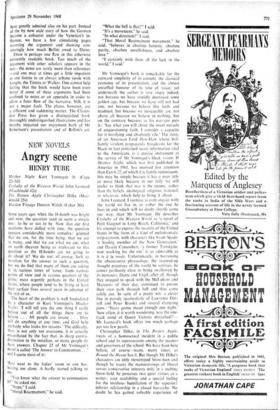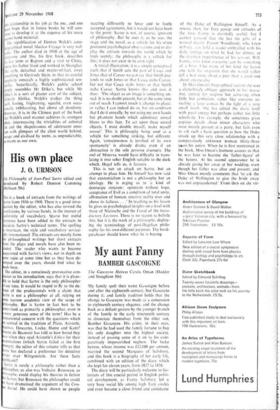NEW NOVELS
Angry scene
HENRY TUBE
Mother Night Kurt Vonnegut Jr (Cape 22s 6d) Crybaby of the Western World John Leonard (Macdonald 42s) The Rotten Apple Christopher Dilke (Mac- donald 25s) Maiden Voyage Denton Welch (Faber 30s) Some years ago, when the H-bomb was bright and new, the question used to seem a simple one: to be or not to be. Now that our first reactions have dulled with time, the question appears considerably more complex: granted that we are, for the time being, that we are so many, and that we are what we are, what on earth (heaven being as irrelevant to this question as the H-bomb) are we going to do about it? We do not, of course, look to novelists for the answer to such a question, but we do find that many of them are asking it, in various tones of voice, from various points of view and in various quarters of the globe; most urgently perhaps in the United States, where people tend to be living at least their surface lives several years in advance of the rest of us.
The heart of the problem is well formulated by a character in Kurt Vonnegut's Mother Night: 'I will tell you the one thing I really believe out of all the things there are to believe . . . All people are insane . . . They will do anything at any time, and God help anybody who looks for reasons.' The difficulty, then. is not only not overcome, it is actually exacerbated by the fact that, in sharp contra- distinction to the novelists, so many people do have answers. Chapter 25- of Mr Vonnegut's novel is called 'The Answer to Communism ...' and I quote most of it : 'Rest went to the ladies' room in one bar, leaving me alone. A barfly started talking to
me.
"You know what the answer to communism is?" he asked me.
"Nope," I said.
"Moral Rearmament," he said.
"What the hell is that?" I said.
"It's a movement," he said.
"In what direction?" I said.
"That Moral Rearmament movement," he said, "believes in absolute honesty, absolute purity, absolute unselfishness, and absolute love."
"I certainly wish them all the luck in the world," I said.'
Mr Vonnegut's book is remarkable for the outward simplicity of its content, the classical economy of its presentation, and the almost unruffled humour of its tone of voice; yet underneath the author is very angry indeed, not because we have stupidly destroyed some golden age, but because we have still not had one, not because we behave like fools and madmen, but because we inescapably are, not above all because we believe in nothing, but on the contrary because, as his narrator puts it: 'Say what you will about the sweet miracle of unquestioning faith, I consider a capacity for it terrifying and absolutely vile.' The story, of an American Lord Haw-Flaw whose bril- liantly virulent propaganda broadcasts for the Nazis in fact contained secret information vital to the Americans, is a precise instrument at the service of Mr Vonnegut's bleak vision. If Mother Night, which was first published in America in 1961, has received less attention than Catch 22, of which it is faintly reminiscent, this may be simply because it has a poor title or more likely because in our folly we still prefer to think that war is the enemy, rather than the beliefs, ideological. religious. national, or whatever, which help to bring it about.
John Leonard, I surmise, is even angrier with the world we live in, or rather the one he lives in and which will no doubt shortly come our way, than Mr Vonnegut. He describes Crybaby of the Western World as 'a novel of Petit Guignol in Long Beach, California,' and his attempt to express the insanity of the United States in 'the form of a kind of melodramatic strip-cartoon, with characters like Svam Spade, 'a leading member of the Now Generation,' and Dasein Camembert, 'a former Trotskyite, now working for the FBI,' is as admirable as it is a la mode. Unfortunately, in borrowing the obscurantist phraseology, the screwed-up thought processes of the world he satirises, he comes perilously close to being swallowed by its monsters. Dante and Virgil, after all, though they stopped to speak with the McLuhans and Marcuses of their day, continued to pursue their own path through hell and thus came safely out. In spite of a pretty wit, a clever line in parody (particularly of Lawrence Dur- rell and Peter Brook) and several clattering puns—'Yeats gonne maud enough one night,' 'how often, it is worth wondering, was the one- track mind of Queen Victoria disraelied?'— Mr Leonard's book offers too much garbage per too few pearls.
Christopher Dilke, in The Rotten Apple, treats of a homosexual incident in a public school and its repercussions among the masters and governors of the school. We have been here before, of course—many, many times, as Round the Horne has it. But though Mr Dilke's characters are only stereotyped Snow-men and though he traces the manoeuvrings of liberal versus conservative interests only in a melting Snow-field, he possesses two quiet virtues as a writer: easy readability and a special feeling for the insidious humiliation of the superior/ inferior relationship in a closed hierarchy. No doubt he has gained valuable experience of this relationship in his job at the sac, and one must hope that in future books he will con- tinue to develop it at the expense of his more second-hand material. The republication of Denton Welch's auto- biographical novel Maiden Voyage is very wel- come. The author died in 1948 at the age of thirty-one and this, his first book, describes Kis last term at Repton and a visit to China, shere his father lived and worked in Shanghai. The style, detached and matter-of-fact, owes something to Gertrude Stein, in that its careful simplicity conceals a highly sophisticated sen- sibility. Superficially, Welch's public school closely resembles Mr Dilke's, but while Mr Dilke's is a sort of plaster cast of the subject, lifelessly lifelike, Welch's evokes the thing itself, boring, frightening, squalid, even occa- sionally exhilarating, but above all desultory. However, it is in the Chinese part of the book that Welch's cool manner achieves its strongest effect. interweaving the trivialities of colonial life and the shapelessness of adolescent emo- tion with glimpses of the alien world behind, savage and civilised by turns, as unpredictable, as insane as our own.







































 Previous page
Previous page